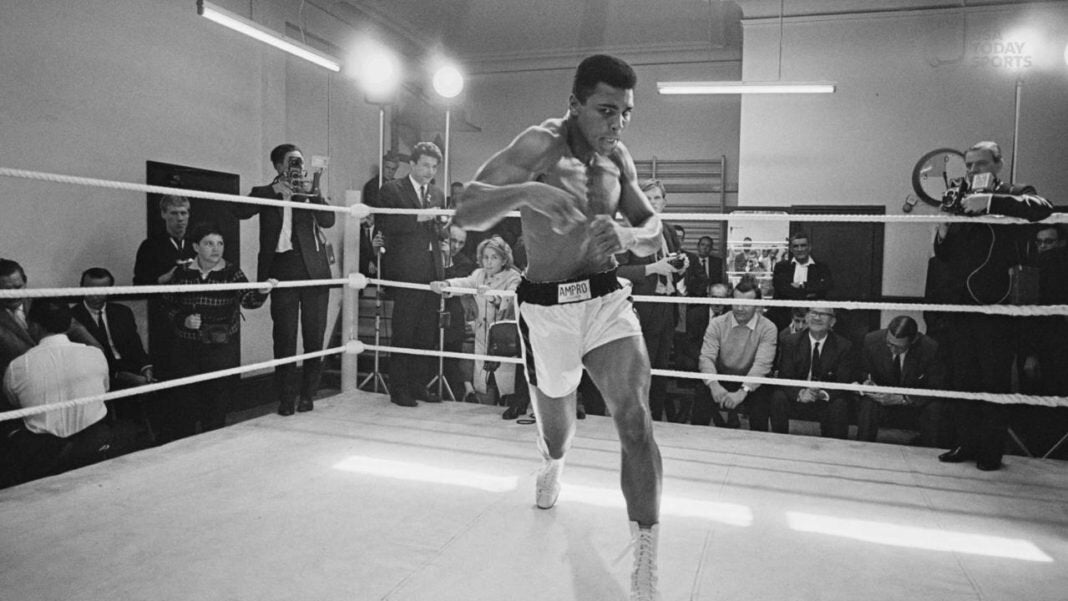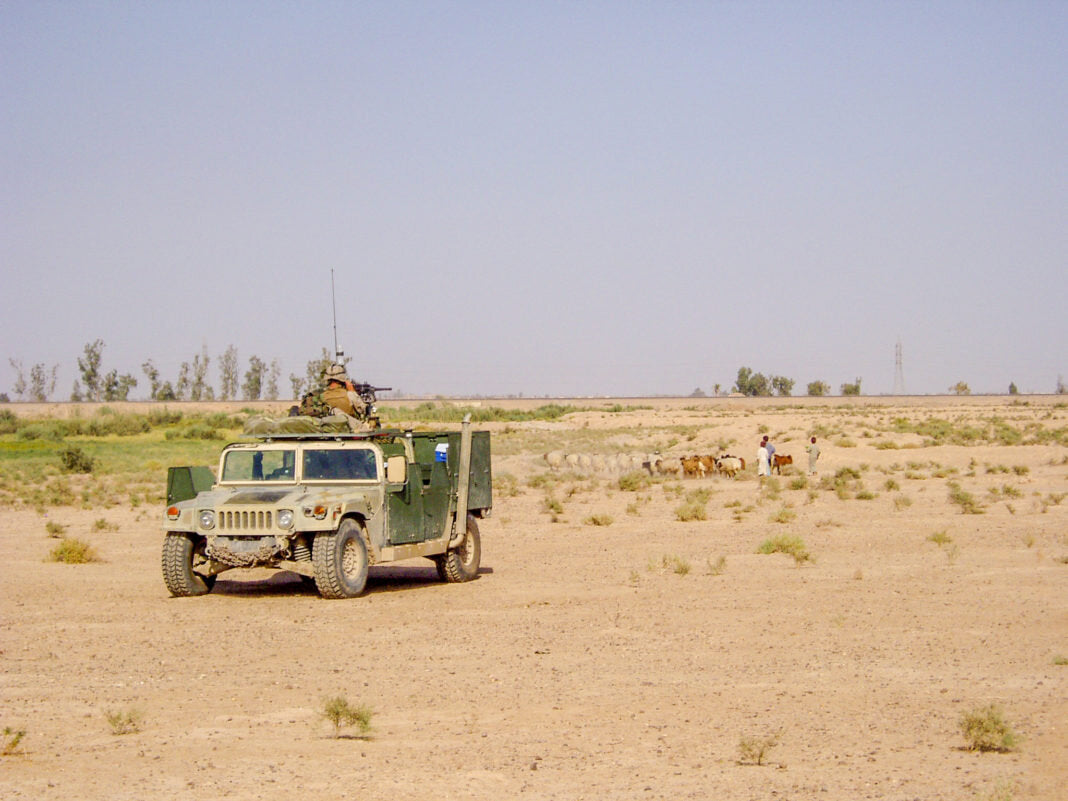
Muhammad Ali: Heroes Get Remembered But Legends Never Die
Muhammad Ali is dead—but the internet, Oh our precious internet, is full of life. Countering the heart-felt remembrance for Ali has been some criticism coming from places very close to and inside the military community.Not all, of course, but generally speaking it comes from the usual suspects.
A young Cassius Marcellus Clay with Joe Elsby Martin the Louisville Kentucky police officer who taught him how to box.Don't get me wrong, the red side of the aisle gets it 'right' on a lot of things. But that said, there is no denying the Far Right, mooching tumor clung to the side of American military culture. The type isn't hard to find; the ones that refuse to believe Pat Tillman was an atheist, and think life was perfect in Appleton, Wisconsin in 1958. From this mass we now see, somewhat predictably, cries that Ali shouldn't be praised, but rather scorned. The criticism; Ali = Draft Dodger. But before getting into anything else, one thing has to be included; strangely, some figures seem to be exempt from this same condemnation. Now I love Ted Nugent (although Pantera's version of “Cat Scratch Fever” is way better), but if getting an idea of how a Far Right icon avoided the draft sounds interesting, I highly suggest checking out this Military.com video(I also highly suggest making some popcorn first). Snopes puts a wet blanket on a little of the video-fire, but nowhere close to all of it. Once past the lively video, hunker back down to the issue—Muhammad Ali the draft dodger.The reality is though, the accusation is a (very) well-documented truth. Ali refused his draft induction. They are right. A closer look at why, however, lends to the defense that the acidity behind the criticism is off base. It boils down to the claim that by Ali refusing to go to Vietnam he acted in a selfish, cowardly, unpatriotic manner.But he didn't.
Muhammed Ali donning the gold medal at the 1960 summer Olympics
Three unidentified black children victims of a random lynching in the 1960s. Such events fueled the sociopolitical climate of the civil rights movementRewind to 1960-61. Ali wins a gold medal for the USA. Soon after he is denied service at a diner for being black. I bet many (if not all) who will remain steadfast against Ali won't take the time or energy required to step back, drop the Mayberry-tinted glasses, and actually react to how they'd view their country if such an insane juxtaposition was the norm for them in their own day-to-day.
And maybe that is a part of it, people are condemning Ali based on the good and bad of the present. But the present is some weak sauce compared to the '60s. That era is a hell of a lot different than some spoiled black college student in 2016 demanding Huckleberry Finn be pulled from every campus due to its racial "triggers." Ali, the diner, that almost unbelievable irony really happened— its not just a few paragraphs to gloss over in some moldy history book. Every service member or veteran whose ever been blatantly disrespected should find some real common ground in this case. Sweat for your country and get shit on. No country or time-period is perfect, of course, and if that would have been a freak incident then this piece would read very different. But whereas anti-military bullshit is sporadic pockets of limp-wristisms, what happened to Ali was just one example of a social reality plaguing the USA during the era so many of Ali's nay-sayers are so nostalgic about.Inch forward a bit to 1967. Ali refused his draft call on the stated grounds of both personal belief and aiding in the ongoing civil rights movement (yeah he did it with loud, pimp-hat delivery—but if that’s why they dislike him. . . well, maybe this is more their speed). In doing so he did nothing short of stand up to the U.S. government.
“I ain’t draft dodging. I ain’t burning no flag. I ain’t running to Canada. I’m staying right here. You want to send me to jail? Fine, you go right ahead. I’ve been in jail for 400 years. I could be there for 4 or 5 more, but I ain’t going no 10,000 miles to help murder and kill other poor people. If I want to die, I’ll die right here, right now, fightin’ you, if I want to die. You my enemy, not no Chinese, no Vietcong, no Japanese. You my opposer when I want freedom. You my opposer when I want justice. You my opposer when I want equality. Want me to go somewhere and fight for you? You won’t even stand up for me right here in America, for my rights and my religious beliefs. You won’t even stand up for my right here at home.
“I ain’t draft dodging. I ain’t burning no flag. I ain’t running to Canada. I’m staying right here. You want to send me to jail? Fine, you go right ahead. I’ve been in jail for 400 years. I could be there for 4 or 5 more, but I ain’t going no 10,000 miles to help murder and kill other poor people. If I want to die, I’ll die right here, right now, fightin’ you, if I want to die. You my enemy, not no Chinese, no Vietcong, no Japanese. You my opposer when I want freedom. You my opposer when I want justice. You my opposer when I want equality. Want me to go somewhere and fight for you? You won’t even stand up for me right here in America, for my rights and my religious beliefs. You won’t even stand up for my right here at home."Distrust of and challenging the government are forces that has flowed down our cultural umbilical-cord since our nation's founding (kinda what motivates the 2A). Pretty darn ‘Merikan, actually—challenging the most powerful of institutions, and at a time when athletes financial security was nothing like it is today. There was no free agency, multi-million dollar endorsements, no cuddly logos to help build their brand. And that is the important thing to take away here, Ali refused his draft induction at significant personal risk. Not as risky as a punji stick, no doubt, but grave consequences on the horizon were things he was aware of. And the consequences came; including being stripped of his passport, threatened with prison, and booted from boxing while still in his athletic prime. Considering all of this, it doesn't seem intuitive that being frightened by the simultaneous threat of war and the loss of comfort is what motivated him. Anyone who has ever watched a YouTube video of him back then, blasting out at a camera crew, knows he was motivated by something else.So then was his motivation unpatriotic?Ultimately, this depends on one's definition of Patriotism. Some would say patriotism doesn't always have to equate to blind and instant obedience. This is especially true if the nation in question needs some serious inner-fixing. Certainly some of Ali's critics would agree it would have been nice if many German boys refused to snap-to in the 1940s.Ali floating-like-a-butterfly away from the draft did a lot of things. One of those was cast a fresher, more critical light on the nature of men being called to war. Here we can look at the criticism against him. Essentially the cries are “He should have gone. No excuses.”Okay, then why? And I'm not just asking merely because of the freekin' diner thing.
Why is it noble to go to war for one's country? Fair question to ask. Seems obvious, but it actually requires a little elaboration—and quit it already with the "for the guy to my left and to my right" gunk. That is post-facto to a war itself. If there is a guy to one's left and right, then there is a reason the three of them are standing there in the first place. That answer is a corny, heart-string puller with little weight and even less explanatory power. So dig deeper, and be honest. If one went to bust heads, god-damn-right and more power to them, but many many more claim they did/do it for "higher" purposes.One commonly held belief is citizens who don the military uniform deserve genuine praise because they're fighting to defend the ideals found in their country. With that in mind—whether they like it or not, whether the Nuge approves of it or not—Ali fought for many American ideals that were underdeveloped in his time. Due to his unique celebrity status, his ultra-vocal opposition to the nature of the draft was used as a platform to shed light on many undemocratic realities of who was eligible and who was exempt, as well as the massive fault-line of racial inequality yet equal obligation to the armed services. Ali, loud-mouthedly and flashy as all hell, helped bring about positive change.Borrowing from the political philosopher John Rawls, if one were stripped—right now—of their race and gender . . . and were about to go through a machine where the chances of coming out the other end a white man, black man, white woman, black woman were all the same. . . and they were given the choices of 1966 and 2016, which one do you think the Ali-critics would really want to be 25 years old in?
If they believe defense of a nation deserves the utmost respect, then hopefully they take a moment to reflect on those who have sought to improve not only the nation but the world through other, often-controversial means—and with personal costs, sometimes great. —Mr. Blonde
Written By David Rose (AKA Mr. Blonde)
June 7, 2016









